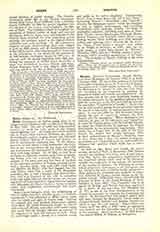

Bernier, ETIENNE-ALEXANDRE, French Bishop, b. at Daon (Mayenne), October 31, 1762; d. at Paris, October 1, 1806. He was at first professor of theology in the higher seminary and in the University of Angers, then pastor of St. Laud’s parish, in that city. During the Revolution he refused to take the Civil Oath, and succeeded by his eloquence in arousing the peasants of Anjou and Vendee into insurrection. He then became one of the most important leaders of the whole movement by his personal influence both with the chiefs and on the different military councils. He was called “L’Apotre de la Vendee”. As to what was his real conduct during this insurrection, towards the end of it especially, its various historians do not agree. At any rate, after the 18th Brumaire, Bernier played the part of negotiator between the First Consul and the insurgents. When Bonaparte had resolved, in spite of all difficulties and opposition, to unite the French nation and the Catholic Church, he chose the Abbe Bernier to represent the French Government in the preparatory negotiations. This choice was a happy one, on the part of the First Consul, for, despite how widely historians differ in their appreciations of Bernier’s character, none of them denies him a deep and subtle intelligence, an untiring and resourceful activity, and a seductive influence—all qualities which made him a clever politician.
As soon as Msgr. Spina and Caselli, the pope’s envoys, arrived at Paris, in November, 1800, Bernier entered into relations with them, and, at once began, with Msgr. Spina, the preparatory negotiations on the important points which were to be discussed, namely, the resignation of the bishops, the reduction of the number of dioceses, the alienation of ecclesiastical properties, nomination to the bishoprics, and the taking of the oath of fidelity to the constitution. They successively presented four projects of reduction, followed by another project drawn up by Napoleon himself. Difficulties arose, necessitating the presence in Paris of the Papal Secretary of State, Consalvi, in June, 1801. The Concordat was to be signed on July 13, and Bernier had been appointed by a decree of the preceding day (Messidor 23, an. IX) as one of the three representatives of the French Government, to conclude the Concordat and sign it. In the meantime, the project agreed upon had been changed by Bonaparte; letters were exchanged between Consalvi and Bernier; Consalvi refused to sign the new project. Negotiations continued until the 16th of July, when an agreement was reached and the Concordat signed at 2 o’clock in the morning. (See Concordat.) In 1802 Bernier was named Bishop of Orleans, by Bonaparte.
G. M. SAUVAGE

